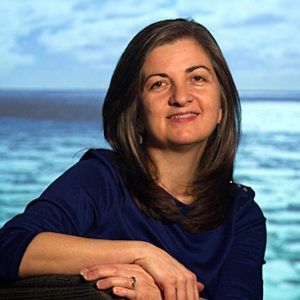 The effects of climate change on marine ecosystems in Antarctica is the next topic of the annual Vetlesen lecture series at the University of Rhode Island.
The effects of climate change on marine ecosystems in Antarctica is the next topic of the annual Vetlesen lecture series at the University of Rhode Island.
Patricia Yager, a professor in the marine sciences department at the University of Georgia, will present her research at 4 p.m., Wednesday, October 18 in the Coastal Institute Auditorium at the Graduate School of Oceanography, 215 South Ferry Road, Narragansett. The event is free and open to the public.
For the last decade, Yager has been part of a team of scientists working in the Amundsen Sea in West Antarctica. Yager’s other projects are in coastal Alaska and Greenland, and the Amazon River Plume.
The Amundsen Sea is about as far as one can get from human civilization. It takes about two weeks to travel there by icebreaker from either the Ross Sea (south of New Zealand) or the West Antarctic Peninsula (south of Chile).
Satellites reveal the Amundsen Sea polynya—a seasonally open water region—to be the greenest and most productive region of coastal Antarctica. Nearby, the West Antarctic Ice Sheet and its glaciers are melting rapidly, contributing to sea-level rise and harming the coastal ecosystem. Sea ice is also melting in the region.
Yager says her research shows a connection between the melting ice sheet and iron to support plankton productivity. Other work involves carbon sequestration by microbial communities in the Amazon River plume. Carbon sequestration is the storage of carbon dioxide that mitigates global warming and prevents climate change.
Yager’s talk is part of the Vetlesen Distinguished Speaker Series, sponsored by the G. Unger Vetlesen Foundation and GSO.
The final lecture is November 18, also at GSO. M. Dennis Hanisak, director of the Harbor Branch Marine Ecosystem Health program at Florida Atlantic University, on “Exploring Pulley Ridge: The Deepest Mesophotic Coral Reef on the U.S. Continental Shelf.”
Since its founding in 1955, the Vetlesen Foundation has advanced prominent oceanographic and earth science institutions in the United States. The foundation provides grants totaling $5 to $7 million annually to various institutions.
The foundation also gives out the Vetlesen Prize, which is awarded biennially for scientific achievement that results in a clearer understanding of the Earth and its history or connection to the universe.
Media Contact:
Elizabeth Rau
401-874-2116
